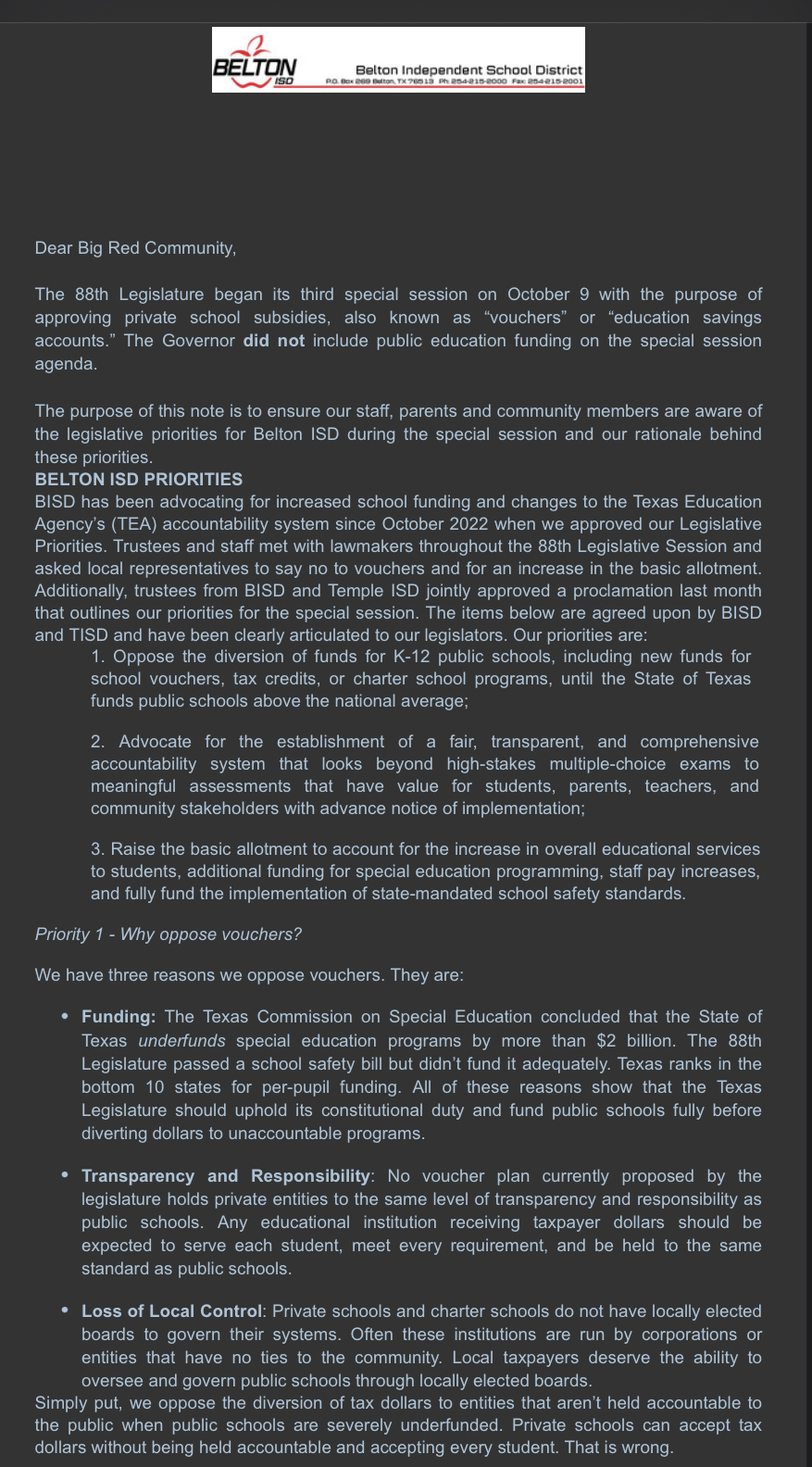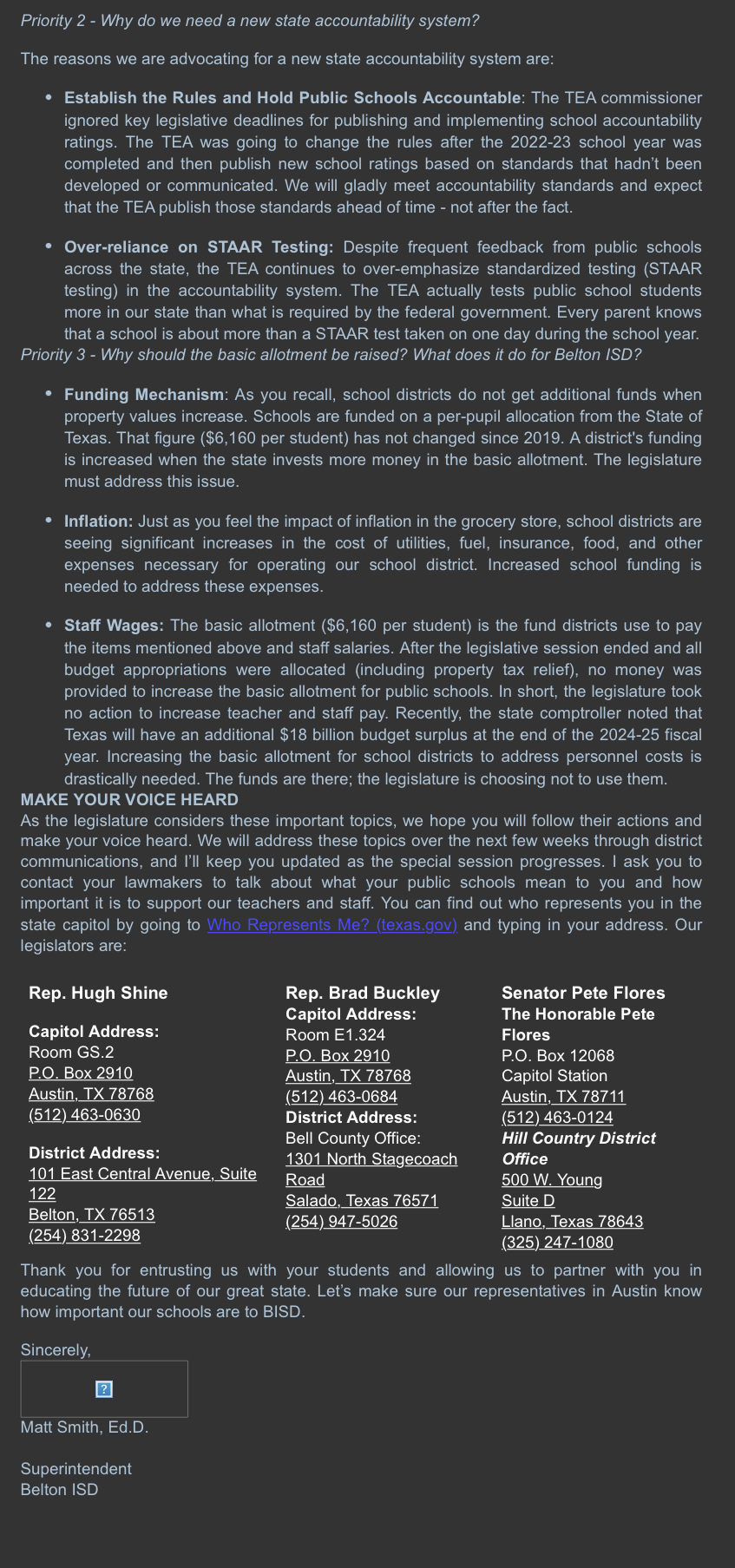Belton ISD, Education Freedom and “Monkey See, Monkey Do” Public School Culture
 Belton ISD provides the latest example of the education industry’s “monkey see, monkey do” culture as school districts ramp up the fight to retain dominance of the K-12 education landscape.
Belton ISD provides the latest example of the education industry’s “monkey see, monkey do” culture as school districts ramp up the fight to retain dominance of the K-12 education landscape.
With its third Special Session underway, the Texas Legislature is tasked with an agenda seeking “Legislation providing education savings accounts for all Texas schoolchildren.” Not surprisingly, this isn’t sitting well with the state’s 1,000+ public school districts.
Using its taxpayer-funded Communications Department, the Belton ISD recently distributed an email to the “Big Red Community.” The email, released by Superintendent Matt Smith, features a rundown of the current Special Session as it relates to a set of district priorities recently co-issued with the Temple ISD.
It also includes district arguments in favor of the priorities and concludes with a “Make Your Voice Heard” call to action.



The call to action promises future updates and encourages advocacy via contacting lawmakers. Contact information for area legislators is also included.
While suggesting no specific position, Smith’s closing statement implies an expectation of support. It reads:
Thank you for entrusting us with your students and allowing us to partner with you in educating the future of our great state. Let’s make sure our representatives in Austin know how important our schools are to BISD.
The Texas Attorney General’s Office offers this information regarding school electioneering:
Texas school officials should be aware of the following:
- According to Section 255.003(a) of the Texas Election Code, an officer or employee of a political subdivision may not knowingly spend or authorize the spending of public funds for political advertising.
- In addition, school district officials may not use public resources to advocate for or against particular political candidates and/or groups of political candidates.
- Furthermore, the Texas Election Code prohibits the board of trust of a school district from using state or local funds “to electioneer for or against any candidate, measure, or political party. Tex. Educ. Code Sec. 11.169.
If you believe these or any other similar statutes have been violated you may file a complaint (see button below), or you may call the Texas Attorney General’s office at1-844-584-3006, or send us an email at violation@oag.texas.gov.
While we currently have no election directly associated with the Special Session and/or its related issues, we in no way suggest this communication would likely qualify as an actual violation of state code. That said, a case can be made that using district communication systems and manpower in the development and distribution of such pieces can be argued as violating the spirit of the law.
Monkey see, monkey do
And on the “monkey see, monkey do” front, it was ironic to find Texas Scorecard reporting on a similar piece by Eagle Mountain-Saginaw ISD Superintendent Jim F. Chadwell.
Before discussing Chadwell’s piece, it’s important to understand the lack of original, individual thought emanating from schools and other governmental entities.
Ideological overlords like the Texas Municipal League (TML), Texas Association of Counties (TAC), Texas Association of School Boards (TASB) and Texas Association of School Administrators (TASA) are natural partners for many of the radical concepts promoted in today’s institutions, but they also are champions, as needed, of the status quo. And whatever the concepts, programs or other direction/activities presented to their member organizations, members unsurprisingly – remember, monkey see, monkey do — fall in line.
And make no mistake. These are not taxpayer-friendly organizations. Instead, their modus operandi is to lobby and work otherwise on behalf of members to seek and retain larger amounts of governmental control and taxpayer funds. Note, these organizations were also discussed in our recent Temple Voters: Don’t Be “October Surprised column.
These professional organizations’ influence is especially obvious during legislative sessions as representatives of these groups are routinely the most ardent proponents of issues like taxpayer-funded lobbying and rolling polling while opposing taxpayer-friendly efforts seeking bond election transparency, school choice, etc. The current Special Session will undoubtedly offer clear examples of the education industry attempting to achieve maximized influence.
With that, it’s difficult to not believe that an organization like TASA or TASB isn’t directing the activism seen with both Smith and Chadwell’s communications. Don’t be surprised to see similar by other superintendents. Monkey see, monkey do.
From Texas Scorecard:
“This message comes with a sense of urgency on actions in our state legislature of which all Texans should take notice,” reads Chadwell’s email. “The Texas Legislature has begun a special session promoted, in part, as a focus on public education.”
Chadwell then claimed the “focus is not about providing adequate funding or support for public education, but rather how to deconstruct public education in Texas through the implementation of school vouchers/education savings accounts.”
The points are familiar. Like Smith, Chadwell also criticizes the legislators for not addressing public school funding to their satisfaction. Perhaps these pieces were crafted prior to last Thursday when Gov. Greg Abbott announced plans to add other public education funding – including teacher pay raises – to the session agenda once education savings accounts are passed.
Public sentiment
The 2022 Republican Primary ballot contained a proposition asking voters if “Texas parents and guardians should have the right to select schools, whether public or private, for their children, and the funding should follow the student.” Statewide, 87.78 percent voted “yes.” In Bell County, that number rose to 89 percent.
The 2012 Republican Primary ballot featured a similar proposition that “allowed parents the freedom to choose their child’s school.” Statewide, 84.6 percent voted in favor of the proposition. In Bell County, that number was 84.85 percent.
Polling information is tricky based on who is asking the questions, who is being asked and how those questions are asked. That said, even The Texas Tribune reports how a University of Texas at Austin survey recently found a plurality of voters support some version of school choice while a Texas Hispanic Policy Foundation and WFAA poll “shows a majority of Texans want to expand school choice and allow parents to use tax dollars to send their children to private school.”
Don’t be fooled
Many Texas political observers think this Special Session brings a great chance for passage of a good education freedom package. The public education industry appears to concur which is why a “red alert” effort will stay visible over the next weeks.
Much information will be put forward by both sides. While the public school establishment seems advantaged with – and will fully use – its ability to expend taxpayer-funded resources in communicating its position, privately-funded organizations like The Texas Public Policy Foundation are also prominent with counter positions as offered with its Debunking the Scare Tactics against Parent Empowerment post.
Meanwhile, look for more “monkey see, monkey do” actions by the public education industry. Smith and Chadwell may be the first distributing these “maintaining the lackluster status quo” calls to action. They won’t, however, be the last. It’s how they roll. Just too bad it’s at not only taxpayer expense, but also the expense of too many Texas school children’s education.
Lou Ann Anderson is a writer, former radio producer and current podcaster at Political Pursuits. Her tenure as Watchdog Wire–Texas editor involved covering state news and coordinating the site’s citizen journalist network. As a past Policy Analyst with Americans for Prosperity–Texas, Lou Ann wrote and spoke on a variety of issues including the growing issue of probate abuse in which wills, trusts, guardianships and powers of attorney are used to loot assets from intended heirs or beneficiaries. She holds a degree from the University of North Texas in Denton.

